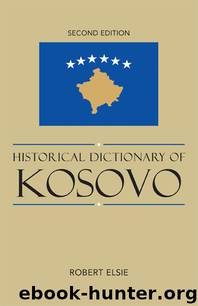Historical Dictionary of Kosovo by Elsie Robert;

Author:Elsie, Robert; [Elsie, Robert]
Language: eng
Format: epub
Publisher: Scarecrow Press
Published: 2009-12-31T16:00:00+00:00
– M –
MACEDONIA, RELATIONS WITH. The ethnic Albanian population of the Former Yugoslav Republic of Macedonia, situated to the south of Kosovo, has close cultural ties to Kosovo. The Albanians there make up about one quarter of the total population of the republic, constituting a sizeable proportion of the population of the capital city, Skopje, and the majority of the population in the Tetova (Mac. Tetovo), Gostivar, Dibra (Mac. Debar), and Struga regions in the west of the country. Ethnic relations with the majority Macedonian Slav community have traditionally been as tenuous as those between the Albanians and Serbs in Kosovo and Serbia. The inequality and injustice suffered by the Albanians of Macedonia under former Yugoslavia increased substantially after Macedonian independence, caused in good part by the Macedonian constitution, which defined the Republic of Macedonia as the state of the Macedonians and which reduced the Albanian community to the level of a minority to be ruled over. Linguistic rights were curtailed, secondary schools were closed down, and higher education was permitted in the Macedonian language only.
The liberation of Kosovo in 1999 brought about a new situation for the Albanians of Macedonia. They grew increasingly impatient with inequality and Macedonian Slav tutelage. Thus, with masses of weapons being smuggled across the border by unemployed elements of the disbanded Kosovo Liberation Army, they were in a position to offer armed resistance to the badly equipped Macedonian military.
On 22 January 2001, a new underground National Liberation Army (Alb. Ushtria Çlirimtare Kombëtare [UCK]—not to be confused with the Kosovo Liberation Army, which is also abbreviated as UÇK) attacked a police station near Tetova. Fighting between the new UÇK and the Macedonian army and police raged through the spring and early summer of that year, with many Albanian refugees fleeing to Kosovo. Particularly bitter was the fighting in Haraçinaj (Mac. Ara�inovo) near Skopje in June 2001. The ethnic conflict between the Albanians and Macedonian Slavs, which brought Macedonia to the verge of full civil war, began to ebb with the signing, under international mediation, of the Ohrid Agreement of 13 August 2001, which promised the Albanians more equality. The domestic situation in Macedonia has since improved, with open discrimination largely overcome and with the Albanians sharing government and power with the Macedonians. Although Macedonia is careful not to irritate Belgrade, it has done much to normalize relations with Kosovo and, in particular, to promote trade relations, which are of vital importance for both countries.
Macedonia, which has a 159-kilometer land border with Kosovo, recognized Kosovo as an independent state on 9 October 2008. A joint committee solved a minor border dispute in October 2009 with a new demarcation and this led the way to the establishment of formal diplomatic relations on 17 October 2009. On 12 November 2009, the Macedonian liaison office in Prishtina was then upgraded to an embassy. Macedonian citizens can now visit Kosovo and Kosovar citizens can visit Macedonia for 90 days visa-free. The countries have increasingly close ties, not only in view
Download
This site does not store any files on its server. We only index and link to content provided by other sites. Please contact the content providers to delete copyright contents if any and email us, we'll remove relevant links or contents immediately.
| Africa | Americas |
| Arctic & Antarctica | Asia |
| Australia & Oceania | Europe |
| Middle East | Russia |
| United States | World |
| Ancient Civilizations | Military |
| Historical Study & Educational Resources |
Room 212 by Kate Stewart(4768)
The Crown by Robert Lacey(4585)
Endurance: Shackleton's Incredible Voyage by Alfred Lansing(4528)
The Iron Duke by The Iron Duke(4135)
The Rape of Nanking by Iris Chang(4033)
Killing England by Bill O'Reilly(3903)
Joan of Arc by Mary Gordon(3808)
Say Nothing by Patrick Radden Keefe(3739)
I'll Give You the Sun by Jandy Nelson(3278)
Shadow of Night by Deborah Harkness(3189)
Hitler's Monsters by Eric Kurlander(3179)
Mary, Queen of Scots, and the Murder of Lord Darnley by Alison Weir(3087)
Blood and Sand by Alex Von Tunzelmann(3072)
Darkest Hour by Anthony McCarten(3023)
Margaret Thatcher: The Autobiography by Thatcher Margaret(2978)
Eleanor & Park by Rainbow Rowell(2952)
Red Famine: Stalin's War on Ukraine by Anne Applebaum(2818)
Book of Life by Deborah Harkness(2736)
The One Memory of Flora Banks by Emily Barr(2695)
